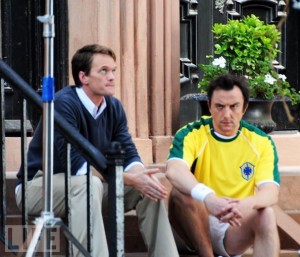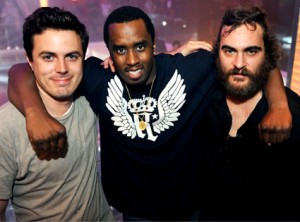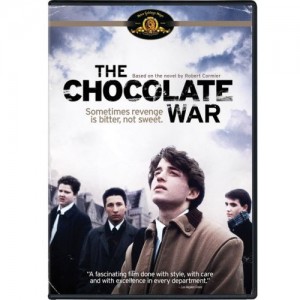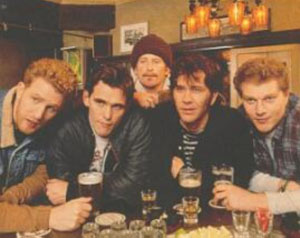Frenzy On Blog Archive for September, 2010
The Best and the Brightest (Dir. Josh Shelov)
I’m a sucker for silly adult comedies, perhaps because they simply don’t make that many of them these days. I adore films like A Fish Called Wanda or Ruthless People that rely on broad humor, bordering on slapstick, but are aimed to appeal to more discerning audiences, but I’m having difficult remembering the last film that even attempted to mine such territory. The slapstick comedies we get instead are mostly parodies that seem like they were shot over the weekend with a B-list cast of characters that are just hamming it up at every possible turn. I’m sorry, but I don’t think seeing someone getting kicked in the nuts is that funny anymore.
The Best and the Brightest is like a breath of fresh, silly air. It doesn’t take itself seriously at all and instead of trying to fire out a joke every two seconds, co-writer/director Josh Shelov allows the humor to comedy from the well-drawn characters and set-pieces. This film has an awareness that most modern farces don’t have, which is: create a misunderstanding that may be beneficial to one set of characters, then put those characters in a situation where the misunderstanding that had worked out to their advantage suddenly seems to teeter on the precipice of disaster. The Best and the Brightest is at its zenith when it milks those situations for all they are worth.
The film stars Neil Patrick Harris and Bonnie Somerville as a young couple who have just moved to New York City from Delaware with their five year old daughter. Their first order of business seems fairly easy: enroll their daughter in a private school. However, the parents soon find out that NYC private schools start their recruitment process fairly early (like the womb) and the odds of getting their daughter into kindergarten by the fall seem pretty low, especially since they are not exactly Rockefellers and don’t have any country club friends. So they enlist the help of a consultant (Amy Sedaris) who specializes in helping parents get their kids into private elementary schools. Chaos – and chuckles – ensue.
I’m hesitant to give any more information about the plot because many of the film’s biggest laughs are tied to it, which is one of the film’s biggest strengths. So often it seems like we’re given scenes in comedies that occur solely for laughs, but here the comedy is coming from such a genuine and organic place. It’s almost like a long Seinfeld episode, where describing one scene becomes difficult because it’s so intricately interwoven into the fabric of the script, making it near impossible to tell about one scene without describing the twenty that got you there. But I will say that a major plot point hinges on the fact that Sedaris’ character has told a white lie about how Harris’ character is actually a poet with a collection coming out. Due to a mix-up, his friend Clark (Peter Serafinowicz, stealing every scene he’s in) accidentally slips Harris dirty text messages and instant messages that he’s printed out, which the stuffy members of the school board take to be poetry…and they find it brilliant. As a result, the scenes of characters reading Harris’ poetry are easily the funniest parts of the film.
That’s another thing that surprised me about the film: the willingness to go to darker places. One would think that a film that hinges on a little girl getting into elementary school would be a “family comedy” with a lot of emphasis on the little girl and how adorable she is. But, that’s not the case with this film. There are no cutesy scenes where the little girl is all precocious. The adults are the focus here and they talk with “adult” language, even though they act like the biggest babies imaginable.
Bonnie Somerville is given the difficult task of playing a character that could easily border on shrill, but she makes us care deeply; she’s likable and plucky and we want her to succeed in her desire to do something different with her life. Neil Patrick Harris is great – almost nobody can do deadpan the way he does – but I almost wish he was given a little bit more to do. Christopher McDonald and Kate Mulgrew are good as a power couple on the board of trustees at the school that the parents decide on. John Hodgeman (of The Daily Show) is hilarious in his few scenes, doing his usual shtick. Amy Sedaris is given a role that is right in her wheelhouse, fast-talking and endearingly mean, which she predictably hits out of the park. But for me the real surprise was Peter Serafinowicz, who you might remember as Sctanley in Couples Retreat, because his character is such a buffoon and those are almost always the roles that wind up being too broad and ridiculous. But Serafinowicz finds the sweet spot and makes Clark into a character that is unapologetic, without an ounce of selflessness in him, and because of the matter-of-fact way that Serafinowicz portrays him, it almost makes him oddly likable.
I would recommend that you see this film in theaters except for one small problem: there’s no release date. This is what happens when you make a film for very little money these days: it’s easier to just slap Neil Patrick Harris’ face on a DVD cover instead of making prints and marketing the film. But I feel like this would be such a missed opportunity since this is a film that truly relies on an audience to help to sell the jokes (like most comedies). Of course, if the film had cost a ton more money because the filmmakers weren’t budget-conscious, then of course studios would release it in 2000 theaters. It’s funny the way it works; if you’re irresponsible with someone else’s money, then you get rewarded with a huge roll-out. Anyway, I implore distribution company to at least show this film in a few theaters, because I really believe word-of-mouth will be strong.
Full disclosure: I know director Josh Shelov, been friendly with him for a few years. I told him before I saw The Best and the Brightest that if I didn’t like it, I wasn’t going to write about it. It was a huge relief that I liked it. It’s not the greatest comedy ever made and I suspect it won’t be for all audiences, but it’s definitely more enjoyable that most of the muck that passes for comedy these days. Whenever it winds up coming out, whether it’s on DVD or in theaters, check it out. It would be hard for someone to have a bad time watching this movie. You might not love it, but you’ll have a few chuckles at least.
The Best and the Brightest is premiering at the Philadelphia Film Festival in late October.
http://bestnbrightestmovie.com/
11 Comments »I’m Still Here (Dir. Casey Affleck)
I don’t really know where to start with this one. I’ve professed my admiration for Casey Affleck and Joaquin Phoenix many times on this site. I think both of them are two of the finest actors that are currently working today and I root for them to succeed in all of their endeavors. When they announced that they were working on this project, that Phoenix was going to become a rapper and Affleck was going to document his journey, I was just kind of bummed that these two brilliant actors would be spending their time on this one project rather than giving us more wonderful performances. I worried that it was going to be a waste of their time.
I was right.
Not only that, it was a waste of my time to watch this movie. The most exciting thing that happens in the film (the Letterman appearance) has already been seen and dissected by most folks that are aware of pop culture. That moment is the climax of the film. But really, that speaks more to the deficiencies in the rest of the film rather than that moment itself.
Reviewing a documentary is different from reviewing a feature and when the creators of this project recently stated that this was, in fact, a feature and that Phoenix had been perpetuating something akin to a hoax, I certainly watched the film differently. But I can’t review it as a feature either because there are people involved in the film who weren’t aware of the shenanigans. So, it becomes a kind of hybrid film, something resembling a Sacha Baron Cohen film. And it makes us long for the brilliance that Cohen brings to those films, the way he actually creates credible characters that are let loose upon the world. More than that, he plays extroverted characters that go out into the world and interact with people. Phoenix has created a mumbling, quiet version of himself that mostly stays at home and does nothing. So the film really just seems like a couple of kids who decided to invite some friends to make a movie in their backyard.
Much is made of Phoenix trying to arrange several meetings with Sean “P. Diddy” Combs, in the hopes that Combs will listen to and love Phoenix’s terrible music. It all goes predictably wrong and Phoenix gets upset about it. If nothing else, Combs deserves consideration for Best Supporting Actors for his stellar performances here and in Get Him to the Greek.
There are scenes of vomiting, drug abuse, fighting, sex, but even if all of these things weren’t staged, they would still be…well, really fucking boring. I was astounded by the fact that I kept looking at the time, waiting for the film to be over. The reason is that there is nothing compelling us forward as viewers, nothing for us to hold onto or hope for. What is the point that Affleck is trying to make here? It can’t really be about the media’s effect on celebrity because the world created here is so insular that we barely see outside of Phoenix’s homes. Is it about the ways in which celebrities delude themselves? Because that’s not really an interesting topic for 99.9% of humanity.
Ultimately, it’s a plodding film that kind of just goes onward with no particular direction. Struggling to find a way to mercifully end the film, Affleck gives us a strange sequence where Phoenix goes to Panama and swims. It’s supposed to be deep, perhaps some kind of metaphor (Water as rebirth? Really?), but it comes off as pretentious and – once again – boring.
I’m really pretty upset at the amount of talent and time that was wasted on this (anti-)vanity project. I don’t know that Phoenix’s portrayal is even a good one because I honestly don’t know how far removed it is from his own personality. Even if it is, Phoenix is not a sympathetic or interesting “character” in this film. He doesn’t invite us in, we don’t know him at all, and he seems like an egomaniac. Antony Langdon plays Phoenix’s friend and assistant and aside from showing off his impressive penis a few times, doesn’t really leave much of an impression. I wish he would get back in the studio with Spacehog and make some good music.
As for Affleck’s direction? Well, let’s say that he doesn’t have his brother Ben’s flair for drama, nor does he have a good sense of pacing or tone. Perhaps with a more conventional narrative, Affleck would be able to prove that he’s a decent filmmaker, but his instincts don’t seem very good from this small sample size.
Honestly, I can’t recommend that you see this film because it won’t offer you any insight nor will it entertain you. Now let’s hope these talented fellas get back to work quickly.
7 Comments »The Chocolate War (Dir. Keith Gordon)
This is something I’ll be doing fairly regularly on the blog, reviewing some older films. Netflix Instant has been a savior for me, enabling me to fill in some of the gaps that all of us film lovers have. And as I make my way through my very long queue, I will share with you my thoughts on the films I’m watching. Some of them will be classics, some of them will be disasters, but most of them will fall somewhere in the middle. And I’ll try to do my best to give you a sense of whether or not a particular film is worth your time.
Keith Gordon’s The Chocolate War is definitely worth your time.
I happen to be a big Keith Gordon fan. If you don’t know that name, then you must seek out his brilliant WWII film A Midnight Clear, which is one of the most underrated and devastating war films ever made that nobody ever talks about. Gordon was a teen actor in the 80s (you might remember him as Rodney Dangerfield’s son in the classic Back to School), but has become a much more accomplished filmmaker than he was an actor. His first film, The Chocolate War, had been unseen by me for no good reason but boy am I glad I watched it today.
We’re immediately aware that the film was made in 1988 when Yaz’s “In My Room” plays over the credits and while the log-line might make the film seem like a typical prep-school hazing film at a corrupt institution, the look of the film is instantly different from the usual fare. Shot mostly in dark rooms or against perpetually gray skies, the camera is fluid in a way that borders on clumsy. Except, there is an artfulness to the clumsiness – something that Gordon utilizes well in A Midnight Clear and later in Mother Night.
I’m hesitant to give away too much of the plot because 1) it’s more complex than I can do justice to and 2) it’s so simple that writing about it could give it away. If that seems contradictory, then good, because that’s what the character of Archie (Wallace Langham), the film’s villain, is. He creates plans that are so complex just for the purpose of humiliating someone else and to gain power for him and his secret society, The Vigils. When Brother Leon (a superb John Glover) asks for Archie’s help in selling boxes of chocolate so that the school can make money – and so that Brother Leon can become headmaster – Archie sees a wonderful opportunity for The Vigils to get away with whatever they want.
The fly in the ointment is young Jerry Renault (Ilan Mitchell-Smith, from Weird Science). When The Vigils tells him to say, “no” to the option of selling chocolate (something that no other student would dare to do), Jerry goes them one further: he continues to say no even after The Vigils tells him to give it up. Jerry dreams of being more of a rebel than he is – gazing languidly at some of the leather-jacket wearing oddballs at the bus stop – and winds up becoming something of a symbol for the kids at the school. The school itself is set up to be something of a fascistic machine that Brother Leon and Archie are a part of and Jerry tries to defy. This winds up angering the guys in charge, as they are scared that young Jerry will disrupt the whole system.
There are a lot of ways to look at the film metaphorically. One could even point out allusions to Nazi Germany. But the truth of the matter is that you can bring whatever you want to do it. The film is deceptively complicated, though, in terms of the politics involved. And every time you think you might have a handle on where the film might go, it goes somewhere else. Jerry himself is something of a Gandhi-like figure for the majority of the film, using passive-resistant to incite his classmates to think about something as seemingly innocuous as selling chocolate.
The film I was most reminded of while watching The Chocolate War was Lindsay Anderson’s If.. except with a bit less of a reliance on surrealism. Although, it must be said, Gordon does go to some surreal places and dream sequences from time to time (coffins in the football field).
The ending is fascinating and surprisingly dark. In the end, it seems, we are all part of the system no matter how hard we try to rebel. I urge you all the give this film a watch and then move on to A Midnight Clear. If you do that, you’ll have a great day of movie-viewing, courtesy of the unheralded Keith Gordon.
10 Comments »Back-seat cricketing
I have a feeling of ennui and loneliness around this time of year because all of my compatriots are in places like Telluride, Toronto, and Venice, seeing films that most of us won’t see for many more months. Oh sure, there’s jealousy involved too – I want to see these films, damn it! – but more than that, I feel deeply saddened because the critics walk out of these films and judge them (via Twitter or blog) immediately. Part of me is anxious to hear how the film is playing and I dutifully check the Twitter feeds of all the folks that are doing the dirty work of actually seeing the movies; the majority of me, however, is almost always disappointed by the quickness with which my fellow movie writers dismiss movies or applaud them. That is not to say that these movies do not deserve dismissal or applause, but the narrative is just shaped too quickly for my liking.
Take a film like Never Let Me Go, for example. In a matter of days, the narrative has turned into this: the film is not for everyone and it will be fairly polarizing. Okay, that seems reasonable enough; after all, the same can be said for the deluge of reviews that accompany a film’s opening. However, writing a full review gives the viewer time to pore over their prose, which gives the writer a chance to re-think their stance. I’m not saying someone who writes that review will have a drastically different opinion, but it’s possible that they will either soften their stance slightly (from “I hated it” to “I didn’t enjoy it”).
It always goes back to my long-standing argument: most films are neither masterpieces or disasters, they are somewhere in between. I’m really getting sick and tired of every critic declaring films as one or the other just because they had a strong reaction to it; both declarations do the films themselves a disservice because they set up unreasonable expectations. But more than the expectations, it shapes a narrative (if you have a loud and respected voice, especially). It’s quite possible that Never Let Me Go is a masterpiece or a disaster and I’ll find out next week, but I’ve got a hunch that it’s neither. Know why I have that hunch? Because I’m right about that 99% of the time. (But, oh that other 1% of the time…)
1 Comment »Up All Night with BEAUTIFUL GIRLS
I have trouble falling asleep. I’m usually up until four or five in the morning. I write, listen to music, read books, but mostly I lay in bed and watch movies in cable. Despite an extensive DVD collection, it’s always more fun to scroll through the channel guide and see what happens to be on rather than getting up out of bed to sift through the DVDs. The great thing about cable TV is that you find out which movies are the most re-watchable. That doesn’t always make them the “best” (for instance, Schindler’s List is a masterpiece but I don’t want to watch it again) but they provide a certain kind of pleasure.
The best “cable” movies are ones that involve lots of characters, interesting interplay between those characters and witty dialogue. For instance, a film like Rounders is in the pantheon of great re-watchable movies. Dazed and Confused is another one. These are films that are addictive, that if you happen to catch a part of one on cable, you’ll wind up sticking around for a few scenes – but most likely, you’ll watch the whole thing.
So last night, I couldn’t sleep as usual. At around 3AM, I contemplated trying to force myself to sleep a bit, but then I saw that Beautiful Girls, the 1996 Ted Demme flick, was just starting. I knew at that moment that I wasn’t going to be able to fall asleep until 5am at the earliest.
Beautiful Girls is a rich film that is like a modern-day Diner (in the Hall of Fame of Rewatchable Movies), about a young man who comes home to a snowy town in Massachusetts for his ten-year high school reunion and winds up bonding with his old friends. Timothy Hutton plays the returning lad, a piano player who earns money playing boozy gigs in Manhattan, and his friends are mostly in a state of arrested development. There’s Matt Dillon as the high school stud who is now stuck plowing snow and doing construction in the summer and sleeping with his married ex (much to his current girlfriend’s chagrin) and living with co-worker Michael Rappaport who has an obsession with supermodels and is trying desperately to win back his girlfriend who has taken up with “Victor the meat cutter.” There’s Noah Emmerich as the one grown-up who is content with his life, Pruitt Tayor Vince as the owner of the local bar, and Max Perlich as the quiet guy.
Then there are the women: Lauren Holly, Uma Thurman, Rosie O’Donnell (in a role that was tailor-made for her and reminds us of how funny/filthy she can be), Martha Plimpton, Annabeth Gish, and young Natalie Portman.
There is no doubt that Portman’s presence in the film and the interplay between her and Hutton is the film’s highlight. The film moves briskly and we are drawn into the problems and emotions of all the characters, but it is the relationship between Hutton’s 28 year-old piano player and Portman’s 13 year-old, precocious next-door neighbor that really makes the film come alive and sing.
Portman is Marty – not short for Martha! – and she and Hutton have a playful friendship that slowly begins to emerge as something else. This being a mostly light-hearted film (with lots of poignancy, to be sure), there is no question of them having some kind of illicit affair. But instead, different questions enter our minds – and indeed, the minds of the characters. These two seem so well-suite for one another that we begin to root for some possible way that they can be together. It’s illogical and impossible and Hutton expresses it best when he tells her that he’s “fully formed” and she has yet to go through all the changes that she will inevitably endure as she grows up. That, despite Marty’s offer to wait five years until she’s legal, he has to grow up now and get on with his life. So Hutton’s character, through his relationship with Marty, finally realizes that he can’t come up with another reason to stall moving forward with his life and his beautiful girlfriend. It sounds more cliche that it actually is.
I would love if the film was a massive success and we could see what would happen if the two of them met now. Would they still feel the same way? It could be like a bizarre version of Before Sunrise and Before Sunset.
Screenwriter Scott Rosenberg and director Ted Demme (RIP) really got to the heart of something tender and they evoke emotion and humor out of the most interesting situations. The dialogue, while certainly contrived, feels real in the mouths of these characters and these actors. There is a bond between them that feels accurate.
So, thanks to Beautiful Girls, I was up pretty late. I kept flipping channels for a little bit and just when I was about to pass out, I saw that The People Vs Larry Flynt was just starting.
“Hmm,” I thought, “haven’t seen that one in a while…”
4 Comments »Quiet Cool
My favorite songs are ones that slowly build to a crescendo – David Bowie’s “Rock N’ Roll Suicide” for example – and I’ve often felt that way about movies. I have always enjoyed the slow build, tightening the screws ever so delicately until the tension is unbearable. Sure, there are great movies that come out firing on all cylinders right from the start, but my preference is to let things slowly sink in. The movies of Antonioni, Rohmer, Malick, Truffaut, and Kubrick have always appealed to me because they were confident enough in their abilities to let things quietly unfold rather than explode. The modern day filmmaker that I think employs this technique most effectively is probably Gus Van Sant; films like Paranoid Park and Elephant unfurl their narratives in an almost maddeningly oblique way. But I find those films to be rewarding because of the work I put into trying to understand them.
This is all to say that it makes me downright giddy that there seem to be a couple films on the horizon that employ this technique. Anton Cobijn’s The American is, according to everyone who has seen it, an Antonioni-esque exercise in languidness. And today, I read a bunch of reviews of Sofia Coppola’s Somewhere that apparently takes place in the same dreamy state as Lost in Translation. And to me, this is the equivalent of most audiences seeing that giant wave in the trailer for The Perfect Storm. When I hear that a movie has a deliberate pace and is compared to a director like Antonioni or Malick, that’s when I get excited.
What are some of the other great “slow-build” movies I’m missing?
2 Comments »















